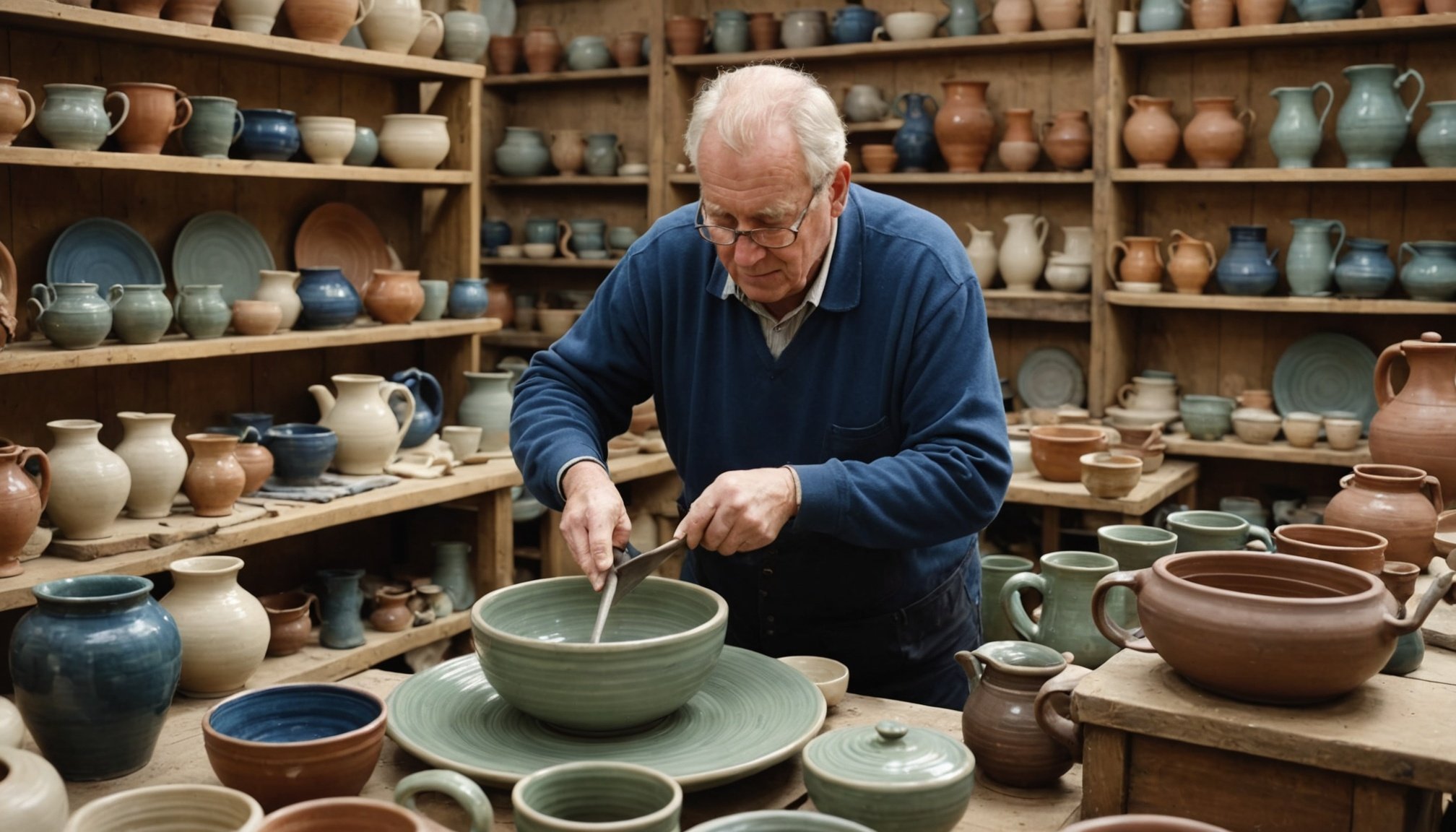Evaluating Pottery Workshops in Stoke-on-Trent
When it comes to selecting pottery workshops in Stoke-on-Trent, several factors ensure a quality pottery experience. The experience of instructors is pivotal; seasoned instructors can provide valuable insights and techniques. Furthermore, class size plays a significant role, influencing the level of personalized attention each participant receives.
Additionally, the array of pottery classes in Stoke-on-Trent offers diverse experiences. Some workshops focus on traditional pottery techniques, while others explore modern approaches, catering to various skill levels and interests. Such variety ensures that every participant finds a suitable learning environment.
Additional reading : France travel guide: discover regions and plan your perfect trip
Reviews and testimonials from past participants are crucial in evaluating workshops. They often highlight the strengths and weaknesses of a pottery class, providing authentic feedback. For instance, participants may rave about a workshop’s friendly environment or note its innovative pottery methods.
Therefore, considering these factors and leveraging reviews can lead to a fulfilling pottery experience. By focusing on seasoned instructors, class size, and diverse classes, potential participants can ensure they choose the best fit, gaining skills and enjoyment from their pottery journey in Stoke-on-Trent.
Also to see : Discover Avebury’s Mysteries: Join a Guided Adventure Through Ancient Stone Circles
Overview of Classic English Pottery Workshops
Stoke-on-Trent’s rich history in the pottery industry makes it an ideal location for immersing oneself in Classic English pottery. Known as “The Potteries,” the city has been instrumental in shaping pottery making globally, with its roots tracing back to the 17th century. This historical backdrop provides an enriching experience for those attending local pottery workshops.
Participants in these workshops often explore classic techniques such as slip casting, hand-building, and wheel-throwing. These methods have been passed down through generations, ensuring the preservation of traditional craftsmanship. Workshops might include teaching modern variants of these techniques, allowing for innovation while respecting the craft’s origins.
Pottery workshops Stoke-on-Trent offers several benefits, with one being the opportunity to learn from skilled artisans deeply embedded in the local culture. Engaging with local experts allows attendees to gain insights and tips tailored to their learning journey. Moreover, workshops often foster a sense of community among participants, creating an environment where learners can share experiences and grow collectively.
The historical and cultural context of Stoke-on-Trent adds depth to the learning process, instilling a sense of belonging and pride within the pottery making community. This unique aspect enhances the overall experience, making local workshops particularly appealing.
Historical Context of Stoke-on-Trent’s Pottery Legacy
Stoke-on-Trent’s rich pottery legacy dates back to the 17th century, establishing the city as a pivotal hub in the industry. This cultural significance is not only a badge of honour but a foundation for modern crafting methods. The city, famously known as “The Potteries,” earned its reputation through an unwavering commitment to craftsmanship and innovation.
Over the centuries, influential potters like Josiah Wedgwood and Thomas Whieldon significantly contributed to the pottery making landscape, revolutionising various techniques and styles that are still respected today. These pioneers played key roles in the development of Classic English pottery, instilling values that remain integral.
Modern workshops in Stoke-on-Trent serve as custodians of this rich history, continuing to teach and preserve traditional pottery methods. They provide participants with an immersive experience, offering a unique blend of pottery heritage and contemporary practices. Such workshops foster an appreciation for the art form, ensuring that the craft’s cultural and historical essence is maintained.
Thus, the city’s commitment to conserving its pottery industry legacy allows its cultural significance to thrive, making the learning experience both historically enriching and practically valuable for participants. This depth offers aspiring potters a profound link to the past while encouraging innovative contributions to the future of pottery.
Featured Pottery Workshops
Exploring pottery workshops in Stoke-on-Trent reveals a vibrant scene filled with creative opportunities. Among the standout offerings is Studio A, known for its unique approach to teaching pottery. This studio emphasises distinctive pottery techniques, blending traditional craftsmanship with modern styles. Availability varies, and pricing details cater to a broad range of budgets, ensuring accessibility for both beginners and advanced learners.
Studio B is celebrated for its diverse array of classes, focusing on various pottery methods. The studio boasts an impressive roster of notable instructors, each bringing unique expertise drawn from extensive backgrounds in the craft. Schedules are flexible, accommodating participants wanting to deepen their skills or try pottery for the first time.
Meanwhile, Studio C offers specialised programmes tailored for both beginner and advanced learners. Participants appreciate the array of materials and tools provided within workshops, enabling hands-on learning. Testimonials frequently highlight the supportive environment that encourages creativity and practical skill development.
By engaging with these workshops, participants not only learn the technical aspects of pottery making but also immerse themselves in a community that cherishes the art form. Such experiences are enhanced by the pottery workshop reviews, which guide new learners in selecting workshops that align with their interests and aspirations.
Techniques and Skills Developed in Workshops
The pottery workshops in Stoke-on-Trent offer participants a deep dive into mastering varied pottery techniques. One of the fundamental skills taught is hand-building, a technique that forms the bedrock of pottery making. This involves shaping clay using hands and simple tools, allowing creators to mould intricate designs with precision.
Another cornerstone is wheel-throwing, a skill revered for its ability to create symmetric pottery shapes. The process requires learners to balance clay on a spinning wheel, demanding focus and coordination. Workshops in Stoke-on-Trent are adept at teaching these methods, offering attendees the chance to hone their abilities under expert guidance.
Participants are also introduced to the glazing and firing processes. Glazing involves coating pottery with a glassy layer for functionality and aesthetic allure. The firing stage follows, where pottery pieces are subjected to high temperatures, solidifying the glaze and strengthening the pottery.
A harmonious blend of traditional and modern approaches in these workshops enhances participants’ creativity. Familiarity with historical methods is paired with opportunities to explore contemporary styles, fostering a well-rounded skill set. This integration ensures that every potter, regardless of experience level, achieves tangible growth in their craft.
Costs and Accessibility of Workshops
Understanding the workshop costs associated with pottery workshops in Stoke-on-Trent is crucial for planning. Typically, the cost for attending such workshops ranges from £30 to £200, depending on the duration and the expertise of the instructors. Introductory sessions, which might last a few hours, tend to be at the lower end of the scale, while week-long immersive experiences will command higher fees.
When considering financial investment, potential participants should look into possible financial aid or discounts offered by certain studios. These may include early bird discounts or seasonal offers. Some workshops might even provide concessions for students or group bookings, making the experience more accessible.
Accessibility extends beyond just finance. Many workshops ensure flexible schedules, offering both evening and weekend classes to accommodate diverse commitments. This flexibility encourages broader participation, inviting enthusiasts from different walks of life to engage in pottery making.
Budgeting is an integral part of planning for beginners. It’s advisable to start with a clear understanding of one’s financial limits and to compare workshop prices. Prioritizing basic pottery techniques can aid in selecting the right workshop that provides foundational skills, ensuring an enriching yet affordable entry into the craft.
Tips for Aspiring Potters
Embarking on a pottery journey can be exciting and rewarding. For beginners, assembling essential tools is crucial. Basic items like clay, a potter’s wheel, sculpting tools, and a kiln are foundational to begin mastering techniques. Quality glazes are important for adding colour and durability to your creations.
Practising pottery techniques at home solidifies newfound skills. Setting up a dedicated space, away from distractions, allows for focused learning. Engaging regularly in fundamental practices like hand-building and wheel-throwing hones dexterity and encourages muscle memory.
Networking with other pottery enthusiasts can greatly enhance one’s skills. Local pottery clubs and online forums provide platforms to share experiences, gain insights, and seek advice. These communities often host workshops or events that facilitate skill enhancement and exposure to different styles.
Additionally, participating in regional events in Stoke-on-Trent offers a closer look into Classic English pottery practices and traditional craftsmanship. Observation and interaction with seasoned artisans provide a wealth of learning opportunities.
Progressing as a potter involves continuous learning, experimentation, and community engagement. By blending self-practice with networking and professional insights, aspiring potters can cultivate both their skills and appreciation for this timeless art form.










